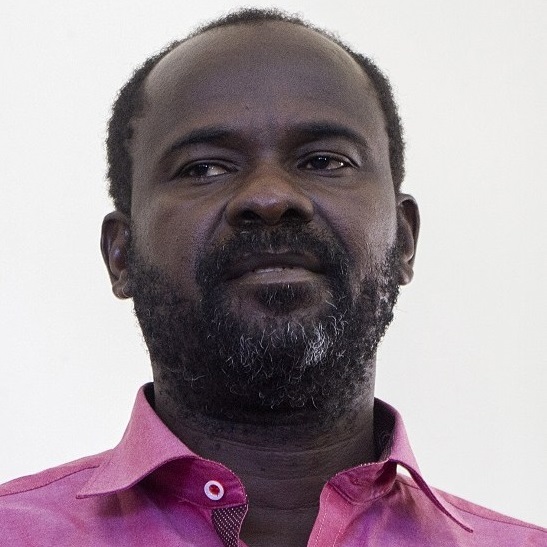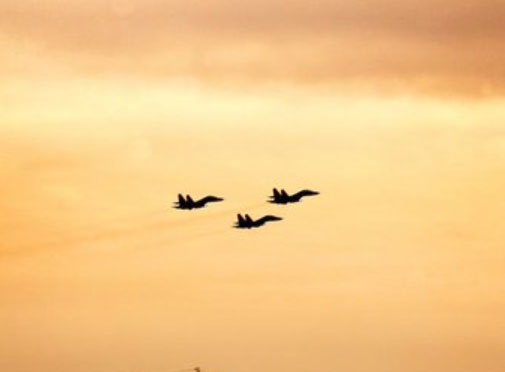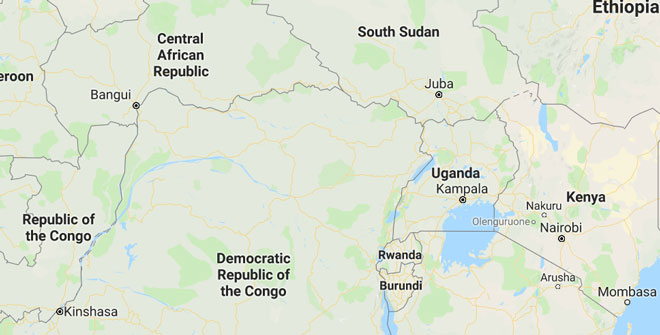
Ugandan army strikes rebel camps in eastern DR Congo
Kampala, Uganda | AFP – Michael O’Hagan | Uganda’s army said Friday it had launched attacks on a shadowy rebel group in the eastern Democratic Republic of Congo, where the militants killed 14 UN peacekeepers earlier this month.
Army spokesman Richard Karemire said the air force and long-range artillery were used in the cross-border strike, however no ground troops were deployed in what was described as a “pre-emptive move”.
He said in a statement that intelligence sharing with the DRC revealed the Allied Democratic Forces (ADF) rebel group was planning “hostile activities” against Uganda.
The ADF, a Ugandan Muslim rebel group whose basic motives and ideology remain unclear, was behind an attack that left 14 Tanzanian peacekeepers dead two weeks ago and scores wounded, according to the UN.
Both Uganda and the DRC insist on a jihadist motive to the group’s actions, however many observers and experts say there has been no proven link with the global jihadist underground, and that this is a “simplistic” explanation for their acts.
Karemire said the strike was the culmination of co-operation between Kinshasa and Kampala against “this growing terrorist menace in our neighbourhood”.
“They have been recruiting, training and carrying out radicalisation even of women and children while working with foreign jihadists,” he said.
Karemire said that while the ADF has conducted massacres in the DRC, it has also “instigated killings of Muslim clerics and some notable people”, in Uganda.
“Of recent, there have been increased signals of intended active hostile activities against Uganda necessitating beefing up security along the border.”

The ADF started out in 1989 with the aim of overthrowing Uganda’s President Yoweri Museveni, who was seen as hostile to Muslims. But it went on to absorb other rebel factions into its ranks and started carrying out attacks in 1995.
Forced westwards by the Ugandan army, the group relocated most of its activities to the DRC, finding a lucrative niche in its lawless, resource-rich east.
Its rollcall of crimes includes mass killings and maiming using machetes, the use of child soldiers and rape, according to the UN.
The ADF was blamed for an ambush on UN peacekeepers in eastern DR Congo in October, which killed two peacekeepers and wounded 12.
It has also been accused by Kinshasa and the UN peacekeeping mission MONUSCO of killing more than 700 people in the Beni region since October 2014.

– Hazy motives –
The group purportedly has links to Somalia’s al-Shabaab and to al-Qaeda. Its founder and leader, Jamil Mukulu, was arrested in Tanzania in April 2015 and was extradited to the DRC, to await trial.
However, a group run by US researcher Jason Stearns published a report last year based on interviews with hundreds of witnesses, claiming several distinct groups “appear to be involved in the massacres”, including soldiers from the regular army.
The government rejected the claims and Stearns was expelled from DRC after the report’s release.
Stearns said on Friday: “The ADF are indeed a military threat. However, our research suggests that the group, which has been in the Congo for over 20 years, is deeply embedded in local society, often collaborating with other Congolese armed groups.
“Rash military action alone is unlikely to pacify this area. First we need to understand the nature of the threat: Who attacked the UN peacekeepers? How were they able to obtain such firepower and sophisticated weaponry?
“What is the relation between the ADF and the proliferation of other armed groups in the Beni region over the past year.”
The ADF are just one of a number of armed groups, based on ethnic or sectarian lines, who roam eastern DRC.
Beni’s mayor Bwanakawa Nyonyi told AFP last year he believes the massacres are carried out by a nebulous group, with politically-motivated “Congolese hands” behind them.
In explaining the violence, some have cited struggles for control of trafficking in various industries like timber, agricultural produce or minerals in a region with extremely rich potential.
 The Independent Uganda: You get the Truth we Pay the Price
The Independent Uganda: You get the Truth we Pay the Price



